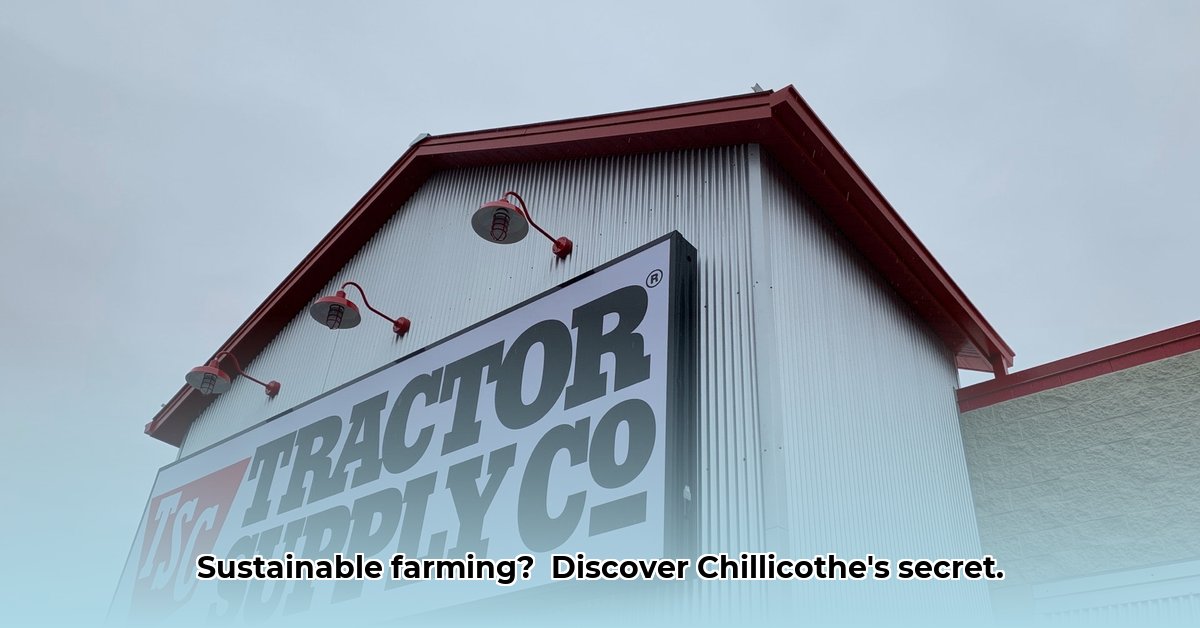
Chillicothe Tractor Supply (CTS) serves as a vital link in the agricultural ecosystem of Chillicothe, Ohio, supporting both large-scale farmers and home gardeners. For similar examples of successful Tractor Supply stores, check out this Chardon Tractor Supply case study. This case study analyzes CTS's role in promoting sustainable agriculture, highlighting its strengths, weaknesses, and opportunities for future growth. We'll explore actionable strategies for CTS, local farmers, and the broader community to foster a more sustainable agricultural landscape.
Product Diversity and Customer Service: A Foundation for Success
CTS boasts a remarkably diverse product range, catering to a wide spectrum of agricultural needs. From animal feed to gardening tools and equipment, the store acts as a one-stop shop for many farming essentials. This breadth of offerings is a significant competitive advantage, allowing customers to consolidate their purchasing needs. But how effective is this diversity in supporting sustainable practices? While the store currently carries many conventional products, the selection of organic fertilizers, pest control solutions, and other eco-friendly options could be substantially expanded. Don't local consumers crave more clarity around product origins and environmental impact? Such transparency could significantly attract environmentally conscious customers.
Furthermore, the knowledgeable and helpful staff at CTS represent a crucial asset. Their expertise and personalized service build customer trust and loyalty, turning individual transactions into lasting relationships. However, to further enhance its commitment to sustainable agriculture, CTS could expand employee training on sustainable farming techniques, organic products, and environmentally responsible practices. This is an investment in both staff development and customer satisfaction.
Challenges and Opportunities: Navigating the Path to Sustainability
Despite its strengths, CTS faces challenges. Supply chain vulnerabilities, fluctuating material costs, and limited availability of sustainable products pose significant hurdles. However, these obstacles present opportunities for strategic growth. A diversified supply chain, incorporating multiple suppliers and emphasizing local sourcing, can mitigate the risk of disruptions. Exploring alternative, more sustainable materials and production methods reduces reliance on potentially environmentally damaging options. This requires an upfront investment, but the long-term gains — enhanced resilience and stronger community engagement — are substantial. A key question to consider is, how can CTS strategically position itself as a leader in sustainable agriculture within the Chillicothe community?
Actionable Strategies: A Collaborative Approach for Growth
The transition to a more sustainable agricultural model demands joint effort from various stakeholders. The following actionable steps outline how CTS, local farmers, and the wider community can work together:
For Tractor Supply (Chillicothe):
- Expand Sustainable Product Offerings (Short-term): Increase the variety of organic and locally sourced products by 25% within the next year. This includes organic seeds, fertilizers, and environmentally friendly pest control solutions.
- Improve Supply Chain Resilience (Long-term): Diversify suppliers and establish relationships with local producers to ensure consistent product availability and reduce reliance on long-distance transportation. Aim for a 15% increase in locally sourced products within three years.
- Enhance Staff Training (Ongoing): Provide comprehensive training on sustainable agricultural practices to all staff, focusing on product knowledge and environmental impacts. Implement a yearly refresher program for continuous improvement. This aims for 100% staff proficiency in sustainable practices.
- Strengthen Online Presence (Short-term): Enhance website content to include detailed information about the environmental benefits of sustainable products. Feature local producers and their products, actively promoting local partnerships.
For Local Farmers and Gardeners:
- Utilize CTS Expertise (Ongoing): Engage actively with CTS staff, utilizing their expertise to find suitable sustainable products and learn best practices for sustainable farming.
- Support Local Producers (Ongoing): Prioritize purchasing sustainable products from local businesses to support the local economy and reduce environmental impact from transportation.
- Share Knowledge and Resources (Long-term): Participate in workshops and educational events hosted by CTS and other organizations to further knowledge exchange within the farming community.
For the Chillicothe Community:
- Support Local Sustainable Businesses (Ongoing): Actively patronize businesses committed to sustainable practices, fostering economic growth and environmental responsibility within the community.
- Participate in Community Initiatives (Ongoing): Support local environmental initiatives and advocate for policies that encourage sustainable agriculture within Chillicothe.
Conclusion: Cultivating a Sustainable Future Together
Chillicothe Tractor Supply holds significant potential to become a driving force in sustainable agriculture within the Chillicothe area. By addressing its challenges proactively and capitalizing on emerging opportunities, CTS can significantly contribute to a more environmentally responsible and economically vibrant community. Remember, a sustainable future is not built in isolation; it requires collaboration, shared responsibility, and a unified commitment to protecting our environment while ensuring the long-term viability of our agricultural systems. This case study only scratches the surface; continuous evaluation and adaptation are essential to achieve true and lasting positive impact.